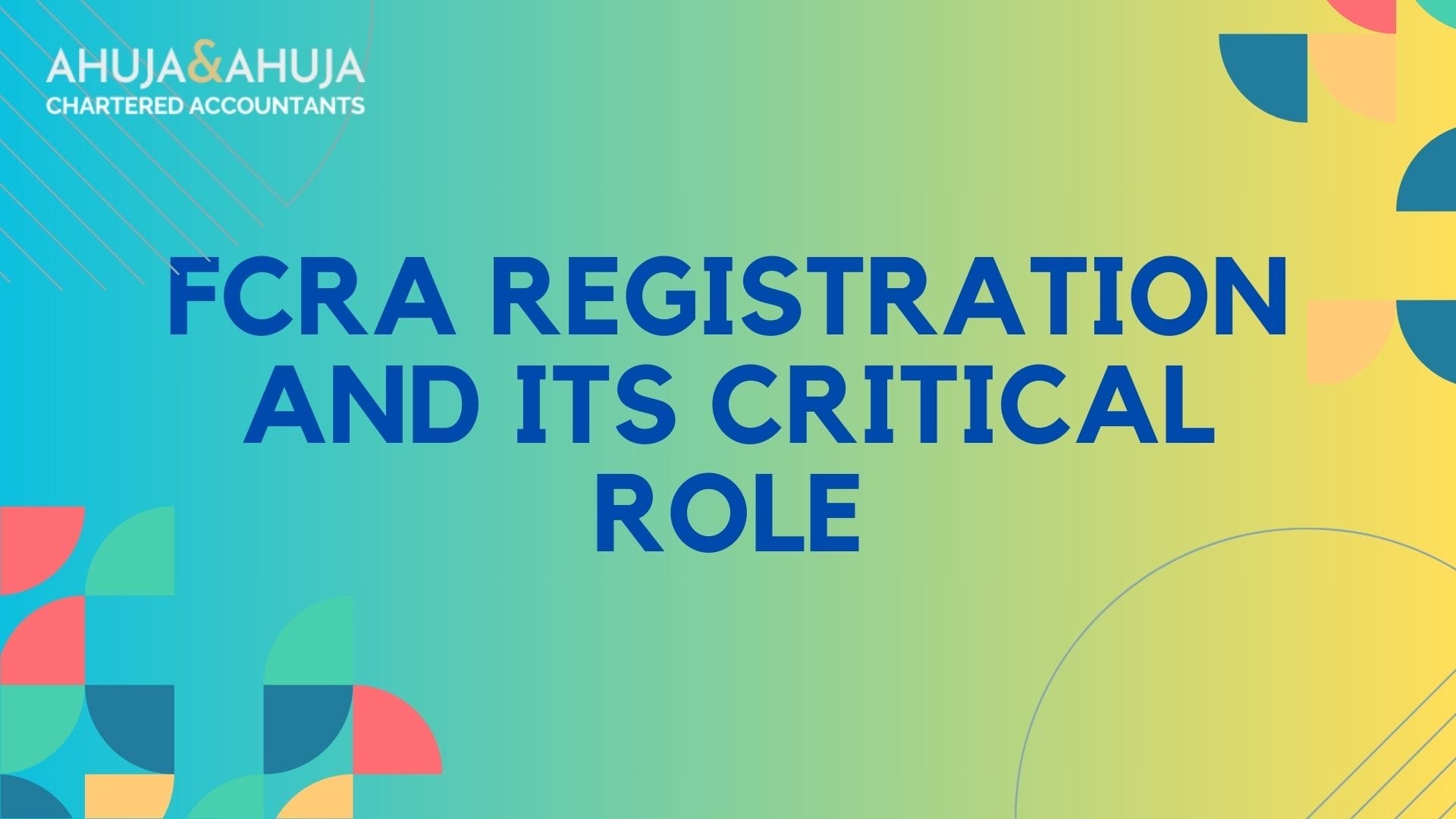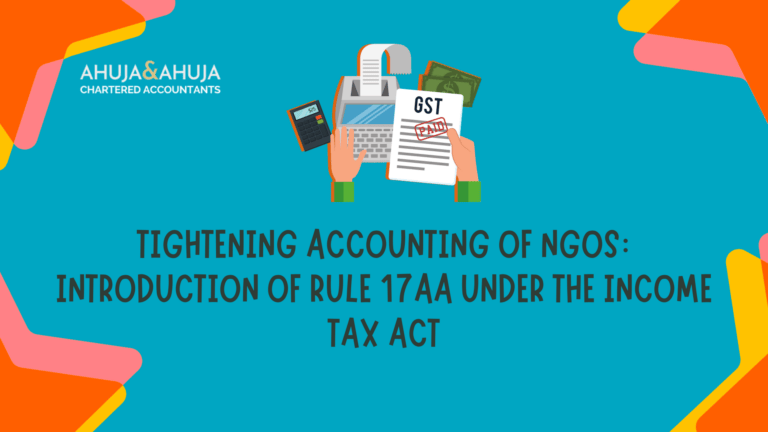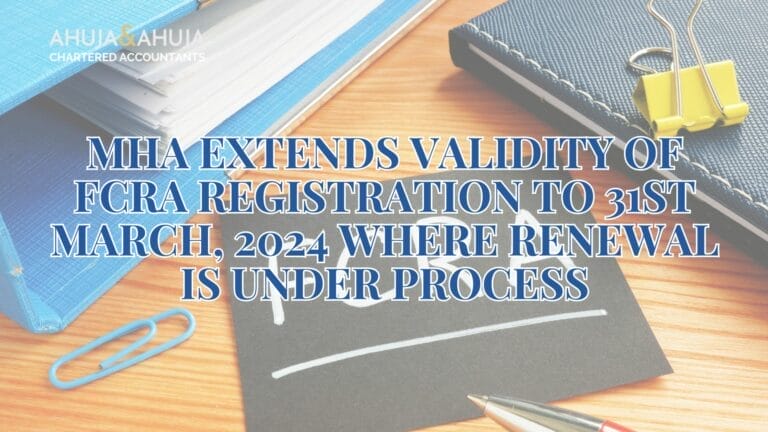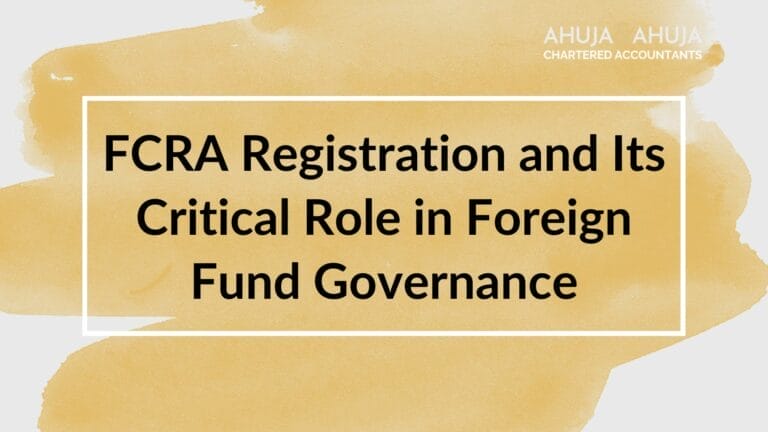A Deep Dive into FCRA Registration
The Foreign Contribution Regulation Act (FCRA) was enacted in 2010 as a stringent mechanism to regulate and monitor charitable organizations receiving foreign contributions. The core of this act revolves around the concept of FCRA registration, a necessary clearance for Charitable Trusts, Societies, and Section 8 Companies accruing donations from outside India. This is mandated under Section 6(1) of the FCRA, 2010, ensuring protection against potential misuse of foreign funding and safeguarding the national interest.
Significance of FCRA Registration
For entities like Charitable Trusts, Societies or a Section 8 Company, the reputation and trustworthiness gained through adhering to legal guidelines such as FCRA can heavily influence their credibility. In this global era, funding is not limited by geographical boundaries, and thus organizations often rely on international donations. FCRA registration legitimizes the receipt of such funds. It serves as evidence of the organization’s transparency, authenticity, and commitment to its cause. In a larger context, it also enables the government to effectively prevent money-laundering or ill-intended practices that could harm India’s security, public interest, or diplomatic relations.
In our subsequent sections, we will delve into details regarding the eligibility for FCRA registration and the alternate ‘prior permission’ route for new organizations seeking foreign contributions. We will also touch upon a detailed review of the criteria checked by authorities for granting an FCRA registration along with the influential work conducted by chartered accountants such as those found in Noida and Gurgaon.
Unquestionably, understanding and complying with FCRA is of paramount importance for organizations seeking foreign contributions. The implicative consequences of mismanaged funds are severe, thus underlining the necessity for ethically scrutinized methods. Stay tuned for an in-depth exploration of this regulatory realm.
Eligibility Criteria for FCRA Registration
Continuing from the FCRA registration overview provided earlier, now let’s dissect the eligibility criteria, which plays a pivotal role in determining whether an organization can reach into the fount of foreign contributions.
Types of Eligible Organizations
FCRA registration pertains to specific organizations devoted to social causes. Trusts, societies, and companies registered under Section 8 of the Companies Act, 2013, with a definitive cultural, educational, economic, religious, or social program, come under this ambit. These entities must inherently abstain from profit dividends, ensuring all incoming resources are funnelled towards achieving their philanthropic objectives.
Operational Period and Financial Accountability
A noteworthy precondition for entities soliciting FCRA registration involves their tenure and financial track record. Prerequisites include a minimum of three years of active operation, ensuring the entity is stable and committed to its core objectives. Furthermore, these entities must have allocated no less than Rs. 10,00,000/-, exclusive of administrative expenditures, towards their organizational objectives over the past three years. To substantiate this financial parameter, applicants must present Income & Expenditure statements, meticulously audited by a credible Chartered Accountant, serving as evidence of their financial diligence.
Documentation Required
As expected, a meticulous catalog of documents accompanies the FCRA registration process, underscoring the seriousness of the scrutiny involved. This dossier typically encloses the entity’s incorporation certificate, detailed activities report, audited financial statements, and board members’ details. The idea is to paint a comprehensive and transparent image of the entity’s workings, financial health, and governance.
Armed with a clear understanding of its eligibility criteria, an organization becomes better positioned to navigate the nuances of FCRA registration. In our approach to comprehensively guiding you through the registration’s ins and outs, these records not only demonstrate fiscal responsibility but also build a foundation of trust with regulatory authorities. We will explore further the processes involved and considerations undertaken for entities that do not meet the conventional criteria but still wish to receive foreign contributions.
Prior Permission Route for New Entities
Established organizations are not the only ones in the philanthropic arena seeking to bolster their initiatives with external aid. Newly formed entities, while not having the requisite operational history, may still seek to garner foreign contributions for specific projects. This is where the concept of “prior permission” comes into play.
Under the prior permission route, even organizations that lack the standard three-year operational history can apply for a one-time permission from the Ministry of Home Affairs (MHA). The catch here is the specificity; applications must detail the particular activity, specify the purpose for which the contribution is solicited, and from whom the funds are expected. An application for this purpose would include details like project reports, consent from the foreign donor, and a clear budget outline, reinforcing the transparent use of the funds.
The process is stringent and necessitates that new organizations display a clear linkage between their intents and the prospective foreign funding. Prior permission is tailor-made for situations where specific endeavors align with generous foreign benefactors sharing similar philanthropic visions.
Next, we will explore the depth of scrutiny by regulatory authorities who undertake a comprehensive vet that scans beyond the surface of documentation, ensuring that the very ethos of the organizations aligns with national values and interests. Stay tuned to understand the rigorous criteria that the Indian government employs to safeguard its soil from socio-economic disturbances, under the guise of charity.
Comprehensive Review by Authorities for Granting FCRA Registration
Let’s delve into the painstaking scrutiny by authorities that underpins the FCRA registration process. This thorough review ensures that any organization vested with foreign contributions conducts itself with integrity, aligning with India’s broader socio-political fabrics.
Authenticity and Background Checks
The foremost step in this audit is ascertaining the authenticity of the entity. The MHA meticulously reviews the history of the organization, looking for any red flags in its establishment and past activities. The review includes verifying the identities of key personnel within the organization and ensuring that it is not merely a front, or “benami,” created to funnel foreign funds for nefarious reasons.
Criminal Record Consideration
More serious checks pertain to the criminal records associated with the entity’s members. Specifically, there is a clear prohibition against individuals or groups that have been involved in acts leading to religious conversions through coercion or allurement, or have been a part of inciting communal tensions. Such a past would be a ground for immediate disqualification, given the delicate communal balance within India that the law seeks to protect.
Integrity in Fund Utilization
The authorities also scrutinize the past utilizations of funds by the applicant. A record that reflects diversion or misallocation of funds, especially for personal gain, could significantly dampen the prospect of approval. Transparency and precision in prior financial reporting can be interpreted as good signs of a well-governed and deserving organization.
Assessment of Ideological Leanings
The registration process is also sensitive to the ideologies that the applying entity propagates. Organizations that advocate for sedition or employ violent means to realize their ends are emphatically rejected. The FCRA regime is designed to ensure that foreign contributions are not misused to create internal unrest or to sidestep the democratic values integral to the Indian polity.
In summary, the FCRA registration process entails more than just a perusal of an organization’s credentials; it is a comprehensive audit of an entity’s moral compass. These rigorous standards echo India’s vigilant stance to prevent misuse of foreign funds that may risk compromising societal harmony or national security. With the subsequent part of our article, we will shed light on the potential adverse impacts considered by Indian authorities before sanctioning any foreign contribution.
Adverse Impacts Evaluated Before Accepting Foreign Contributions
The FCRA registration process is designed with intentional vigilance to uphold national integrity. The thorough vetting procedure by the Indian authorities includes evaluating the impact of foreign contributions on the following areas:
Sovereignty and Integrity of India
Any acceptance of foreign contributions must first affirm that it does not, in any way, harm the sovereignty and integrity of the state. The MHA’s stringent checks ensure that donations do not become a conduit for foreign influence that might affect the core values and national interests of India.
State Security and Public Interest
The organizations are analyzed to ascertain that the foreign funds will not undermine the security of the state or contradict public interest. Contributions that could potentially fuel conflicts, aid terror activities, or catalyze subversive movements are meticulously screened out.
Electoral and Societal Impact
The sanctity of India’s electoral process and the relationship between its diverse societal groups are of paramount importance. FCRA regulations are structured to prevent any distorting foreign influence over elections. Similarly, contributions that could disturb the societal equilibrium, fostering hostility between different communities, castes, or religions, are scrutinized with utmost severity.
International Relations and Societal Harmony
Maintaining amicable international relations and societal harmony is a significant concern while assessing the admissibility of foreign funds. The government ensures that the ingress of foreign funds should not destabilize India’s diplomatic stance or disrupt its multicultural social fabric.
Considering the comprehensive nature of such evaluations, potential risks are mitigated, thereby safeguarding the public and electoral interests, along with the overall well-being of the nation.
To conclude this part of our discussion, it is evident that Indian authorities are tasked with a monumental responsibility. They don the role of gatekeepers who prevent the percolation of foreign funds into activities that might risk the tranquil state of Indian democracy, its social ethos, and national interests.
Consequences of Mismanagement of Foreign Funds
As we reach the penultimate discussion point of our FCRA article, let’s address the weighty consequences that mismanagement of foreign funds can entail. Mismanagement not only discredits the organization but can also have wider socio-political repercussions.
Mismanagement and Its Ramifications
The misuse of foreign contributions is a breach of trust and statutory obligations, leading to legal action, including the cancellation of FCRA registration. Beyond the legal repercussions, it damages the credibility and integrity of the not-for-profit sector in India. This could lead to a loss of prospective international funding, not just for the concerned organization but also for other legitimate entities within the country.
Importance of Transparency and Integrity
The fund management norms underline the paramount importance of transparency and integrity in handling foreign funds. Financial propriety is non-negotiable, and entities must ensure that all contributions are applied judiciously towards the fulfillment of stated objectives. The involvement of professional services, such as the formidable network of Chartered Accountants in India, lends additional scrutiny and assures compliance with all regulatory requirements.
Maintaining Public and National Interest
Transparency in financial dealings is not just a matter of regulatory compliance; it is a testament to an organization’s commitment to upholding the public and national interest. Proper management of foreign funds assuages concerns over the influence exerted by external forces on domestic affairs and fortifies societal trust in the not-for-profit sector.
Conclusion
To navigate the complexities of the FCRA registration process is to engage with a framework that is inherently mindful of the delicate equilibrium of India’s sectored interests. The integrity of charitable trusts, societies, and Section 8 companies in managing foreign funds is not only pivotal to their existence but also to the very principle of national and public welfare.
As we have surveyed, FCRA registration is a meticulous and comprehensive process that underscores the Indian authorities’ dedication to scrutinize entities to prevent the misallocation of foreign funds. Entities must engage with this process armed with detailed and authentic documentation, a clean historical slate, and a strong framework for fund management.
While the FCRA framework aims to encourage genuine welfare activities by enabling access to foreign contributions, it unequivocally mandates vigilance and transparency. As such, entities that honor these principles strengthen the social fabric and reinforce India’s sovereignty and democratic ethos.
Let us be reminded that the role of FCRA in safeguarding the interests of India is a profound one, and it remains a testament to the venerable balance of allowing foreign assistance while protecting sovereignty.
Disclaimer
The materials provided herein are solely for educational and informational purposes. No attorney/professional-client relationship is created when you access or use the site or the materials. The information presented on this site does not constitute legal or professional advice and should not be relied upon for such purposes or used as a substitute for professional or legal advice.






Thanks for this insightful blog! It provided a clear understanding of FCRA registration and its importance. Really helpful!